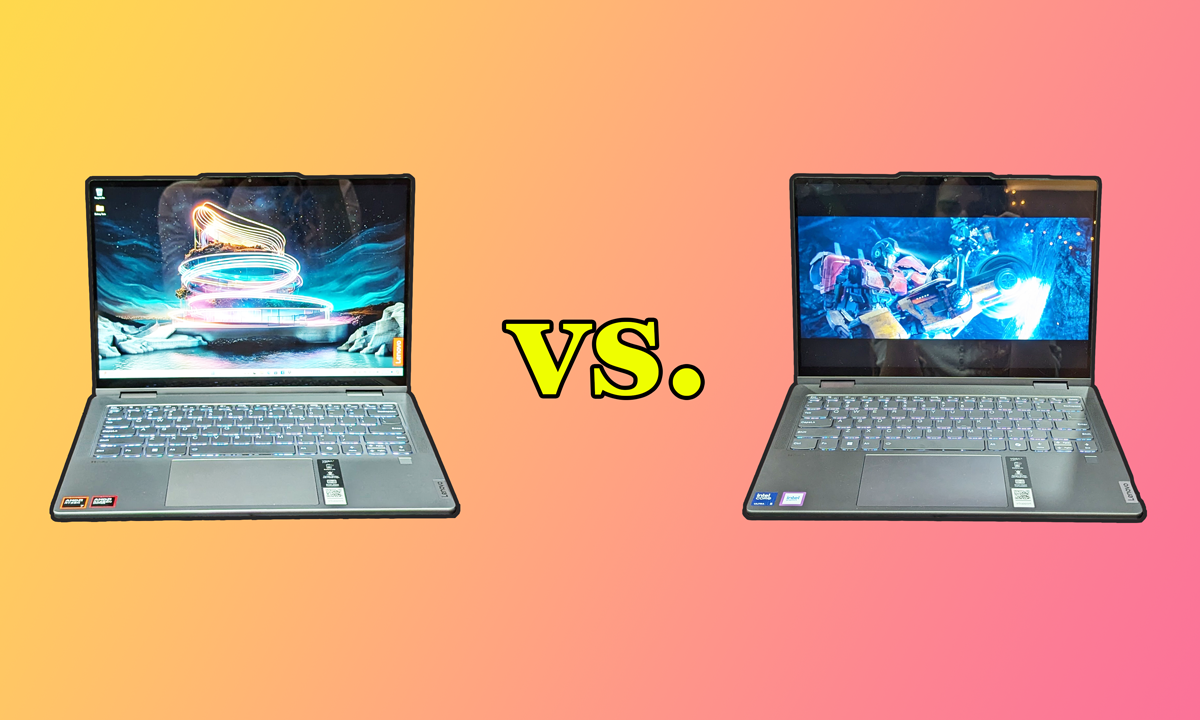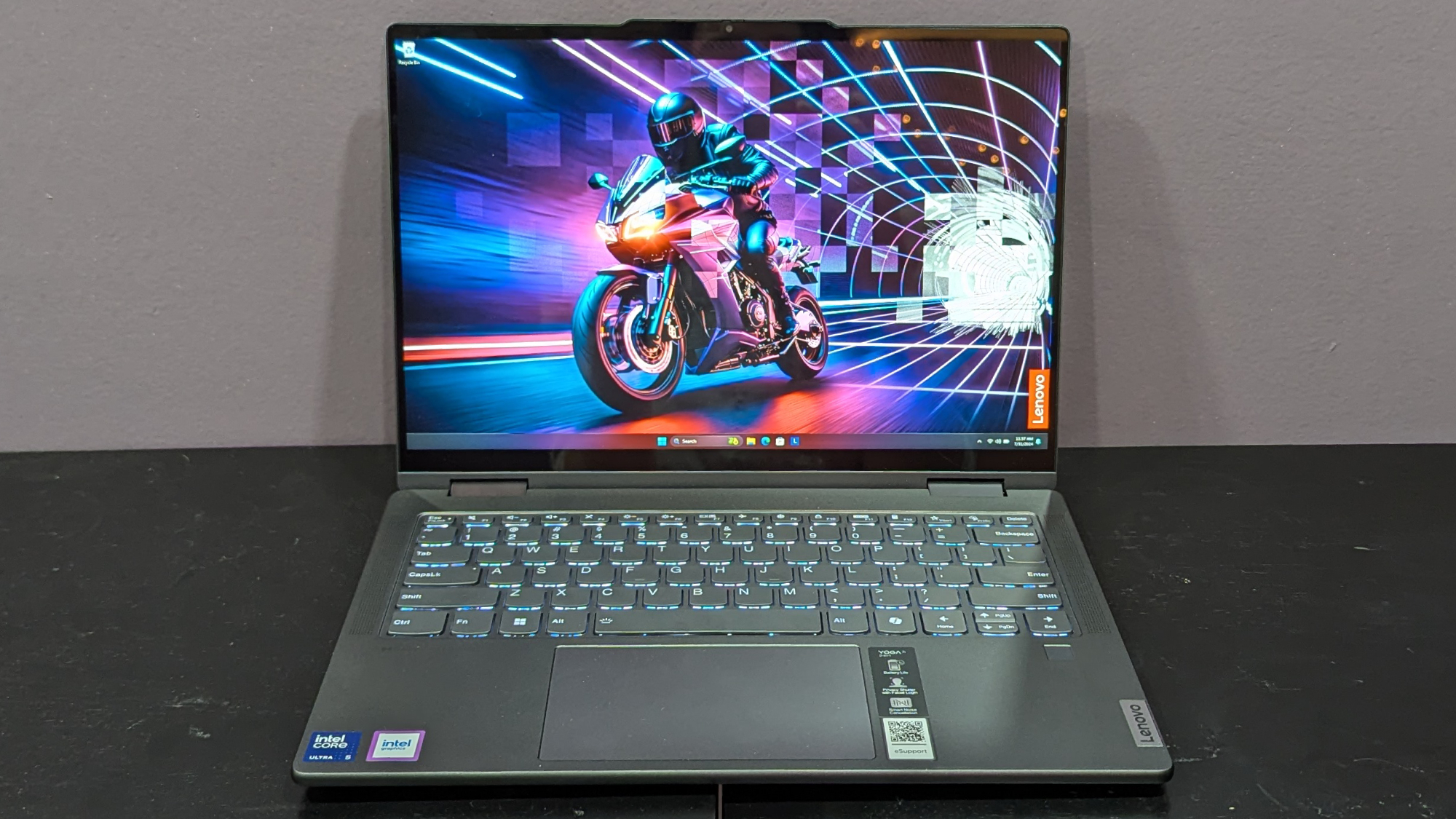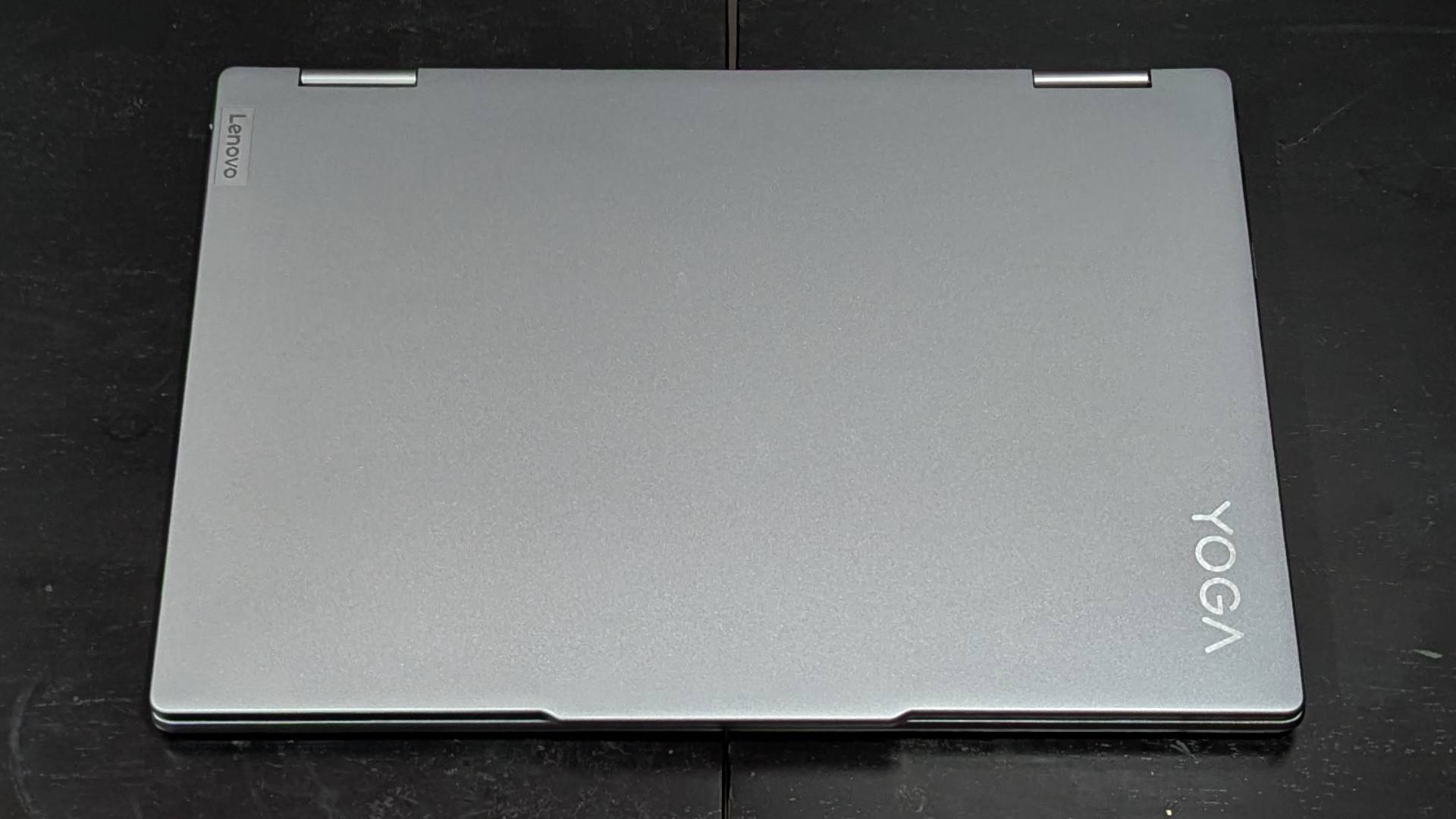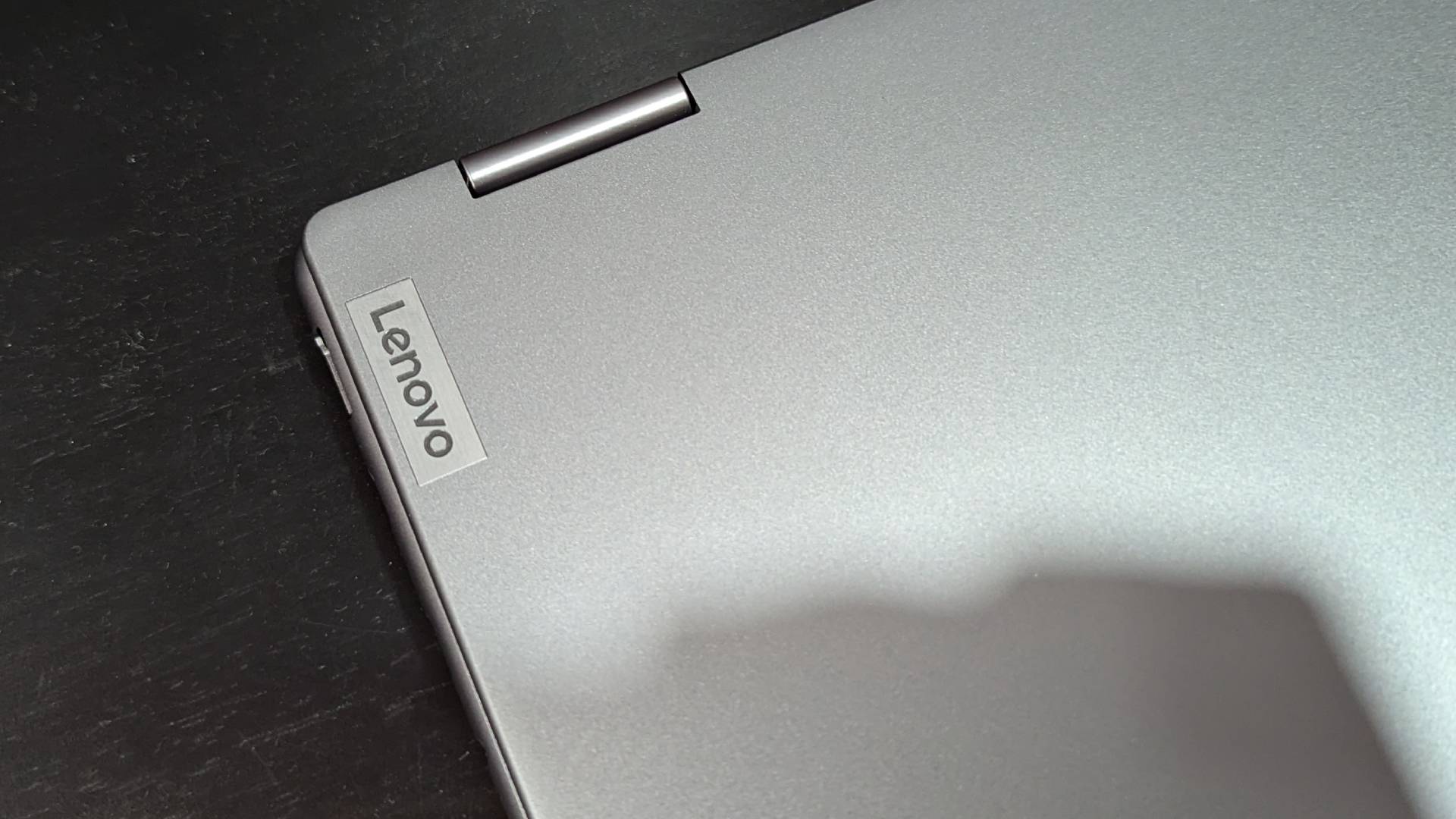
It's rare that Laptop Mag has the opportunity to pit two highly comparable laptops against each other, but that's exactly what has happened here.
In this corner, the Lenovo Yoga 7 2-in-1. And in the other corner is the Lenovo Yoga 7i 2-in-1.
Both of these models are identical in nearly every way. The most noticeable difference is that one has an Intel processor and the other an AMD processor. It's a pretty common tactic for Lenovo laptops, and the company marks its Intel models with a little "i" right after the model type.
Normally, the difference between AMD and Intel is small enough that a faceoff of this caliber isn't necessary.
But not this time. One of these laptops is far superior to the other.
These laptops are identical in design, keyboard, display, webcam, and touchpad, so we'll focus on the categories where the inclusion of an AMD or Intel processor actually matters: Price, performance, and, most importantly for many users, battery life.
Lenovo Yoga 7 2-in-1 vs Lenovo Yoga 7i 2-in-1: Specs compared
Lenovo Yoga 7 2-in-1 (AMD) vs Lenovo Yoga 7i 2-in-1: Price
The Lenovo Yoga 7 (AMD) we reviewed is built with:
- AMD Ryzen 7 8840HS
- AMD Radeon 780M integrated graphics
- 16GB of LPDDR5X 6400MHz RAM
- 1TB of SSD storage
- A 14-inch, 1,920 x 1,200-pixel display at a 60Hz refresh rate
- It costs $899 from Lenovo.

The Lenovo Yoga 7i is the same, except it replaces its AMD processor with an Intel Ultra 5 125U and drops down to 512GB of RAM. It also cost $899 from Lenovo.
Determining which is the victor in price is challenging, as it's not a simple question of which is cheaper.
Determining which is the victor in price is challenging, as it's not a simple question of which is cheaper. If that was all it took for one to win, the AMD-powered Lenovo Yoga 7 2-in-1 would take this victory, as it starts at $749 versus Intel's base price of $899.
Instead, it's about what each laptop accomplishes at its price. As for the AMD-powered model, it offers superior performance but mediocre battery life. The Intel-powered model makes small sacrifices to performance but has excellent battery life. In reality, they're both worth what they ask for in price, so there's not much of a winner here.
Winner: Draw
Lenovo Yoga 7 2-in-1 vs Lenovo Yoga 7i 2-in-1: Performance
Considering what separates these two laptops is their processor, discerning the difference in performance is vital.

On the Geekbench 6 overall performance test, the Yoga 7i's multi-core score of 9,214 is about what we'd expect out of an Intel Core Ultra 5 125U processor. It's a little worse than the category average of 10,276, but it's still pretty decent by all accounts. However, the Lenovo Yoga 7 2-in-1's AMD Ryzen 7 8840HS pulled quite a bit ahead with its multi-core score of 11,287.
When converting a 4K video to 1080p using the Handbrake app, it took the Yoga 7i 10 minutes and 14 seconds to complete the task, which is slower than the 8-minute, 3-second category average. AMD once again pulls ahead here, managing to be first place by completing it in 7 minutes and 3 seconds.
AMD may seem like the obvious winner here, it's hard to give a definitive verdict.
However, while AMD may seem like the obvious winner here, it's hard to give a definitive verdict.
It's a bit difficult to compare these two chips when the Intel Core Ultra 5 125U is the lowest-tier processor of its line, while the AMD Ryzen 7 8840HS is a mid-tier processor.
It would be more accurate to compare the Intel Core Ultra 7 155H to the AMD Ryzen 7 8840HS, as they're both mid-tier processors in their respective lines. If we took something like the Asus Zenbook 14 OLED, which is powered by that processor, its 12,707 Geekbench 6 multi-core score clearly brings it back to the top of the pack.
On the other hand, the Ryzen 7-powered Yoga 7 2-in-1 is equivalent in price to the Intel Ultra 5-powered Yoga 7i 2-in-1, so we're content to give AMD this win.
Winner: Lenovo Yoga 7 2-in-1 (AMD)
Lenovo Yoga 7 2-in-1 vs Lenovo Yoga 7i 2-in-1: Battery life
While the AMD-powered Lenovo Yoga 7 has done well enough for itself thus far, this is where things take a turn for the worst.
On the Laptop Mag battery life test, which involves continuous web surfing at 150 nits, the Lenovo Yoga 7i 2-in-1 lasted 12 hours and 57 minutes before running out of juice. That's three hours longer than the current category average of 9 hours, 58 minutes.

As Intel, Apple, and Qualcomm have made incredible progress in power efficiency, expectations for battery life have skyrocketed. As a result, we normally recommend battery life that is at least 10 hours or longer, and the Intel-powered Lenovo Yoga 7i absolutely crushes those expectations.
However, AMD fails to maintain the lead it acquired from its higher cost-to-performance ratio, as everything fell apart when the Lenovo Yoga 7 2-in-1 lasted 8 hours and 2 minutes after the same test.
Not only is this two hours shorter than our category average, but it's two hours below what we generally recommend for a productivity laptop.
Considering that Intel's Yoga 7i lasts five whole hours longer than AMD's Yoga 7, there's no contest. The Intel version wins in a rout.
Winner: Lenovo Yoga 7i 2-in-1 (Intel).
We normally recommend battery life that is at least 10 hours or longer, and the Intel-powered Lenovo Yoga 7i absolutely crushes those expectations.
Lenovo Yoga 7 2-in-1 vs Lenovo Yoga 7i 2-in-1: Overall winner
We can recommend the AMD-powered Lenovo Yoga 7 2-in-1 to people who don't plan to rely on long battery life or expect to be tethered to an outlet frequently. If so, its lower cost-to-performance ratio than the Intel-powered model will appeal to you.
But that doesn't apply to most people, as most people looking to use a 14-inch 2-in-1 will probably want to bring it on the go. And because the Intel model has 5 hours longer battery life than the AMD model, the winner for most individuals is clear as day.
Winner: Lenovo Yoga 7i 2-in-1 (Intel)







